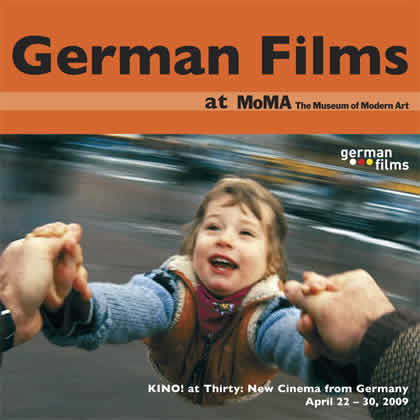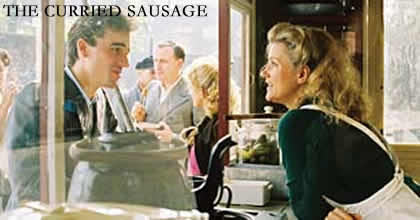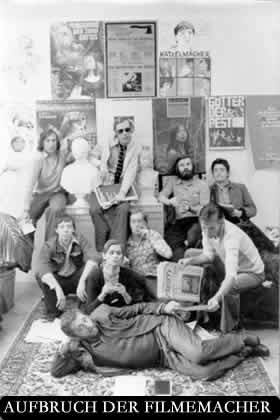 30 years ago, in 1979, Adrienne Mancia together with Laurence Kardish curated the first work show of new German cinema at New York’s Museum of Modern Art.
30 years ago, in 1979, Adrienne Mancia together with Laurence Kardish curated the first work show of new German cinema at New York’s Museum of Modern Art.
And ever since every year, MoMA presents an overview of noteworthy German film productions. This year, in time for its 30th anniversary, the series titled KINO! NEW CINEMA FROM GERMANY was moved from its annual dark and dreary November slot to a spring loaded April date.
The work show opened on April 22nd with a cocktail reception at the elegant MoMA sculpture garden, followed by the US premiere of DEUTSCHLAND 09 – 13 FILME ZUR LAGE DER NATION, GERMANY 09 – 13 SHORT FILMS ABOUT THE STATE OF THE NATION, 2009 – by some of Germany’s top emerging and established filmmakers. Filmmakers Wolfgang Becker and Hans Steinbichler as well as producers Verena Rahmig and Dirk Wilutzky were present for the opening screening of their work.
As every year, KINO! is co-presented with German Films as well as the Goethe Institute New York and the Consulate General of the Federal Republic of Germany, NY – and so the following day, the Goethe Institute NY invited everyone downtown to the WYOMING BUILDING, their new performance venue in the hip East Village. Raw and yet to be renovated, it was like entering a Berlin make-shift-performance-space – a fitting location to further discuss the opening film GERMANY O9 with filmmakers, producers and the audience.
NY-based German filmmaker and author Pia Frankenberg moderated the evening. Producers Verena Rahmig and Dirk Wilutzky explained that together with filmmaker and producer Tom Tykwer, the films’ idea was to give an insight into contemporary Germany as seen through the eyes of the different filmmakers – similar to the seminal 1978 anthology collection GERMANY IN AUTUMN, a cinematic response to the terrorist events during the autumn of 1977.
In GERMANY 09, each filmmaker was free to decide what kind of film to make – the only guidelines were: 12 minutes to offer a personal view of the state of the nation 20 years after the fall of the wall. To start, the producers cast a wide net and approached many filmmakers. Amongst them also Andreas Dresen (e.g. NACHTGESTALTEN, NIGHTSHAPES, 1999, SOMMER VORM BALKON, SUMMER IN BERLIN, 2005, WOLKE 9, CLOUD 9, 2007), one of Germany’s top filmmakers. According to Wilutzky, although he really wanted to participate, he was busy with two projects at the same time, and just could not make his schedule work. Once the slate was set, the clock started ticking, as the producers wanted to have all projects finished in time for a 2009 premiere – the 20th anniversary of the fall of the wall. As Rahmig recalls, together with editor Mathilde Bonnefoy, they spend a lot of time screening and discussing each film to decide which order of films works best – to arrive at the final selection.
Director Wolfgang Becker (amongst others DAS LEBEN IST EINE BAUSTELLE, LIFE IS ALL YOU GET, 1997, GOODBYE LENIN, 2003) disclosed that he had three different ideas for his short film – and mischievously admitted picking the one least suitable for a short film. And so he had a very hard time sticking to the 12 minute limit with his short KRANKES HAUS, SICK HOUSE. Eventually he delivered a 15 minute film, with some great scenes missing, as he said regretfully.
Hans Steinbichler (amongst others WINTERREISE, WINTER’S JOURNEY, 2006) explained that his short film, the socio-political farce FRAKTUR was a personal response to the lay out changes of the daily newspaper FRANKFURTER ALLGEMEINE ZEITUNG in  late 2007. He was surprised to see himself that upset when the paper changed its typeface and started including color photographs on its front page. When asked whether FRAKTUR’s radical protagonist, played by Josef Bierbichler, existed in Germany, Steinbichler answered that he met similar guys – however, Bierbichler contributed a lot in depth and scope to the character.
late 2007. He was surprised to see himself that upset when the paper changed its typeface and started including color photographs on its front page. When asked whether FRAKTUR’s radical protagonist, played by Josef Bierbichler, existed in Germany, Steinbichler answered that he met similar guys – however, Bierbichler contributed a lot in depth and scope to the character.
The producers further discussed the film’s controversial reception during the Berlinale. The German audience responded well – however, some German critics simply ripped the film to pieces. As Rahmig and Wilutzky recalled, it seemed like they had just been waiting for this film to come along to. However, they are confident that similar to DEUTSCHLAND IM HERBST, GERMANY IN AUTUMN, 1978, GERMANY 09 will become a testament of its time – offering a few glimpses into contemporary German sensitivities.
This year’s KINO! included another testament of Germany film history with GEGENSCHUSS – AUFBRUCH DER FILMEMACHER, REVERSE SHOT – REBELLION OF THE FILMMAKERS, 2008 by the late Laurens Straub and documentarian Dominik Wessely – an inspired documentary about the rise, fall and collapse of the production and distribution collective FILMVERLAG DER AUTOREN – founded by the postwar new wave of German filmmakers in the 1970’s. Amongst its core members were the big three: Rainer Werner Fassbinder, Wim Wenders and Werner Herzog. REVERSE SHOT is peppered with poignant interviews and archival material; most notably a TV interview with Rainer Werner Fassbinder shortly after the award winning premiere of his feature ANGST ESSEN SEELE, (ALI – FEAR EATS THE SOUL, 1974) at the 1974 Cannes Film Festival. Stunned by the strong international interest in such an apparently local and domestic film, the TV moderator seems to attack rather than complement Fassbinder for his success. And much to Fassbinder’s credit, he reacts calm and collected. An absurd yet telling scene. Wessely was present for the presentation of his work. He answered to the audience that they did not know whether they could get all the partners of the collective to appear on camera – as some are no longer on friendly terms with each other – but eventually everyone agreed. Wessley joked that they probably all joined in to make sure that their side of the story was included.
 A NY audience favorite was Ulla Wagner’s feature film DIE ERFINDUNG DER CURRYWURST, (THE INVENTION OF THE CURRIED SAUSAGE, 2008). Based on Uwe Timm’s bestselling novel with the same title it stars award winning NY-based German actress Barbara Sukowa. Including Fassbinder’s BERLIN ALEXANDERPLATZ, 1980 and LOLA, 1981, Sukowa has a long list of German as well as international productions to her credit. THE CURRIED SAUSAGES takes place in Hamburg during the last months of World War 2 and Sukowa portraits Lena Brueck, a resilient and resourceful German restaurateur – who together with her chef can make wine out of water. While waiting for her husband and son to return home from the war, she meets the much younger Hermann (Alexander Khuon), a soldier on his way back out to the front. Head over heels the two fall for each other – and Hermann decides to stay with her, hiding in her apartment. Once the war is lost, Lena resists telling Hermann for fear of losing him and their romance. And just as expected, once he finds out that Germany surrendered, he leaves her to returns home to his wife and family. Likewise, Lena’s husband and son return from the front. However, resourceful Lena does not surrender to being a wife and mother again. First she kicks out her cheating husband and then starts up her own business, a small sidewalk kiosk. Trading this for that, she ends up with a huge can of curry powder – a reminder of Hermann who told her about his travels to India and tasting all its exciting spices – and a crate of tomato sauce. When she accidentally drops the crate…. voilà…. as the story goes…. she discovers the essential ingredients of a curried sausage…..
A NY audience favorite was Ulla Wagner’s feature film DIE ERFINDUNG DER CURRYWURST, (THE INVENTION OF THE CURRIED SAUSAGE, 2008). Based on Uwe Timm’s bestselling novel with the same title it stars award winning NY-based German actress Barbara Sukowa. Including Fassbinder’s BERLIN ALEXANDERPLATZ, 1980 and LOLA, 1981, Sukowa has a long list of German as well as international productions to her credit. THE CURRIED SAUSAGES takes place in Hamburg during the last months of World War 2 and Sukowa portraits Lena Brueck, a resilient and resourceful German restaurateur – who together with her chef can make wine out of water. While waiting for her husband and son to return home from the war, she meets the much younger Hermann (Alexander Khuon), a soldier on his way back out to the front. Head over heels the two fall for each other – and Hermann decides to stay with her, hiding in her apartment. Once the war is lost, Lena resists telling Hermann for fear of losing him and their romance. And just as expected, once he finds out that Germany surrendered, he leaves her to returns home to his wife and family. Likewise, Lena’s husband and son return from the front. However, resourceful Lena does not surrender to being a wife and mother again. First she kicks out her cheating husband and then starts up her own business, a small sidewalk kiosk. Trading this for that, she ends up with a huge can of curry powder – a reminder of Hermann who told her about his travels to India and tasting all its exciting spices – and a crate of tomato sauce. When she accidentally drops the crate…. voilà…. as the story goes…. she discovers the essential ingredients of a curried sausage…..
A tasty blend of drama, tragedy and humor with a pinch of history, THE INVENTION OF THE CURRIED SAUSAGE is a strong vehicle for leading actress Barbara Sukowa who was honored with the best actress award at last year’s Montreal World Film Festival.
Further films in this years work show were Christian Klandt’s powerful first feature WELTSTADT, CITY OF THE WORLD, 2008, a grim and gruesome look at disillusioned youngsters in a small Eastern Germany town, Christian Schowchow’s feature NOVEMBERKIND, NOVEMBERCHILD, 2008, a program of shorts titled SHORT, EXCELLENT AND FAMOUS, and a three-film retrospective with Rainer Werner Fassbinder’s HAENDLER DER VIER JAHRESZEITEN, MERCHANT OF FOUR SEASONS (1971), Werner Herzog’s 1976’s STROSZK and Margarete von Trotta’s SCHWESTERN ODER DIE BALANCE DES GLUECKS, SISTERS OR THE BALANCE OF HAPPINESS (1979).
For more information on recent and past German films, festivals and film news, please visit the comprehensive German Films website: www.german-films.de

